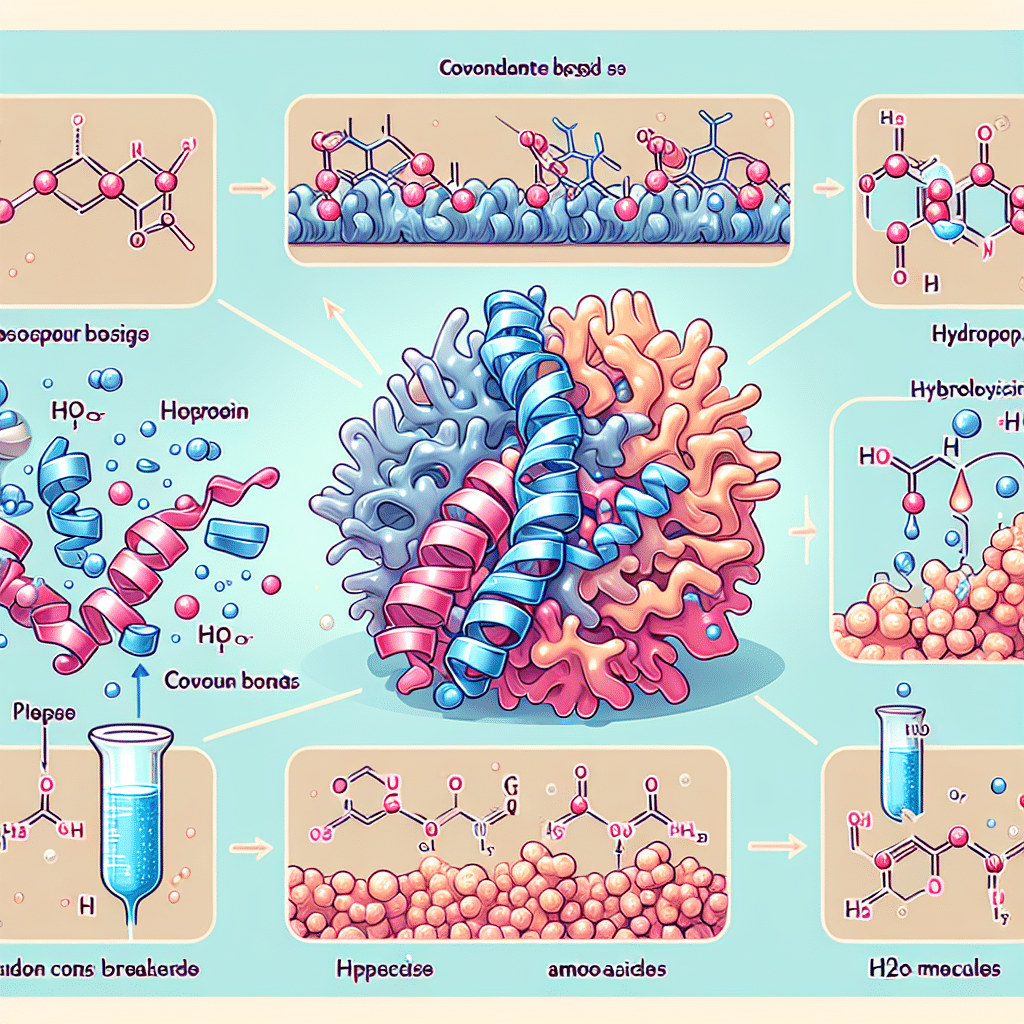Can you give an example of hydrolyzed protein?Find out here
Table of Contents
- Hydrolyzed Protein Explained: A Comprehensive Guide
- Understanding Hydrolyzed Proteins
- Benefits of Hydrolyzed Proteins
- Case Study: Whey Protein Hydrolysate
- Production of Whey Protein Hydrolysate
- Applications of Whey Protein Hydrolysate
- Statistics and Market Trends
- Conclusion: The Significance of Hydrolyzed Proteins
- Discover ETprotein’s High-Quality Hydrolyzed Proteins
Hydrolyzed Protein Explained: A Comprehensive Guide

Proteins are essential macromolecules that play a critical role in virtually all biological processes. In their native form, proteins are large, complex molecules that the body must break down into smaller units called amino acids during digestion. However, this process can be replicated outside the body through a method known as hydrolysis, resulting in hydrolyzed proteins. This article delves into what hydrolyzed proteins are, their benefits, and provides a detailed example of a hydrolyzed protein product.
Understanding Hydrolyzed Proteins
Hydrolyzed proteins are proteins that have been broken down into smaller peptide fragments and amino acids. The hydrolysis process involves treating the protein with water, acid, or enzymes, which cleave the peptide bonds holding the amino acids together. This process mimics the natural digestive process, making the proteins easier to absorb and utilize by the body.
Benefits of Hydrolyzed Proteins
Hydrolyzed proteins offer several advantages over their non-hydrolyzed counterparts:
- Enhanced Absorption: The smaller peptides and amino acids are more readily absorbed by the body.
- Reduced Allergenicity: Hydrolysis can reduce the allergenic potential of certain proteins, making them suitable for individuals with food sensitivities.
- Improved Solubility: Hydrolyzed proteins tend to be more soluble, which is beneficial in various food and beverage applications.
- Functional Properties: These proteins can improve the texture, emulsification, and foaming properties in food products.
Case Study: Whey Protein Hydrolysate
One of the most common examples of a hydrolyzed protein is whey protein hydrolysate. Whey is a byproduct of cheese production and is a rich source of high-quality protein. When whey protein is hydrolyzed, it is broken down into smaller peptides, which can lead to faster digestion and absorption compared to intact whey protein concentrate or isolate.
Production of Whey Protein Hydrolysate
The production of whey protein hydrolysate involves several steps:
- Filtering the whey to remove fats and lactose.
- Using enzymes to hydrolyze the whey protein into smaller peptides.
- Further processing to remove any unwanted flavors or odors.
Applications of Whey Protein Hydrolysate
Whey protein hydrolysate is used in various applications, including:
- Sports nutrition products for rapid muscle recovery.
- Infant formula as it is gentle on the digestive system.
- Clinical nutrition for patients with compromised digestion.
- Functional foods and beverages for enhanced protein content.
Statistics and Market Trends
The demand for hydrolyzed proteins, particularly in the sports nutrition and infant formula sectors, has been on the rise. According to market research, the global hydrolyzed protein market is expected to grow significantly in the coming years, driven by increasing health consciousness and the growing fitness industry.
Conclusion: The Significance of Hydrolyzed Proteins
Hydrolyzed proteins, such as whey protein hydrolysate, offer numerous benefits, including improved digestibility, reduced allergenicity, and functional properties that make them valuable in various industries. As consumer awareness and demand for easily digestible, high-quality protein sources continue to grow, hydrolyzed proteins are likely to play an increasingly important role in nutrition and food science.
Discover ETprotein’s High-Quality Hydrolyzed Proteins
If you’re looking for premium hydrolyzed proteins, ETprotein offers a range of products that cater to diverse industry needs. Their hydrolyzed protein options are characterized by neutral taste, non-GMO, and allergen-free attributes, ensuring that you receive the highest quality ingredients for your nutritional supplements and food products.
About ETprotein:
ETprotein, a reputable protein and L-(+)-Ergothioneine (EGT) Chinese factory manufacturer and supplier, is renowned for producing, stocking, exporting, and delivering the highest quality organic bulk vegan proteins and L-(+)-Ergothioneine. They include Organic rice protein, clear rice protein, pea protein, clear pea protein, watermelon seed protein, pumpkin seed protein, sunflower seed protein, mung bean protein, peanut protein, and L-(+)-Ergothioneine EGT Pharmaceutical grade, L-(+)-Ergothioneine EGT food grade, L-(+)-Ergothioneine EGT cosmetic grade, L-(+)-Ergothioneine EGT reference grade and L-(+)-Ergothioneine EGT standard. Their offerings, characterized by a neutral taste, non-GMO, allergen-free attributes, with L-(+)-Ergothioneine purity over 98%, 99%, cater to a diverse range of industries. They serve nutraceutical, pharmaceutical, cosmeceutical, veterinary, as well as food and beverage finished product distributors, traders, and manufacturers across Europe, USA, Canada, Australia, Thailand, Japan, Korea, Brazil, and Chile, among others.
ETprotein specialization includes exporting and delivering tailor-made protein powder and finished nutritional supplements. Their extensive product range covers sectors like Food and Beverage, Sports Nutrition, Weight Management, Dietary Supplements, Health and Wellness Products, and Infant Formula, ensuring comprehensive solutions to meet all your protein needs.
As a trusted company by leading global food and beverage brands and Fortune 500 companies, ETprotein reinforces China’s reputation in the global arena. For more information or to sample their products, please contact them and email sales(at)ETprotein.com today.












